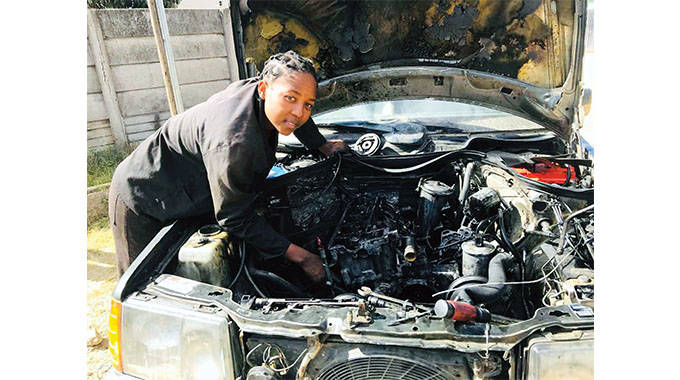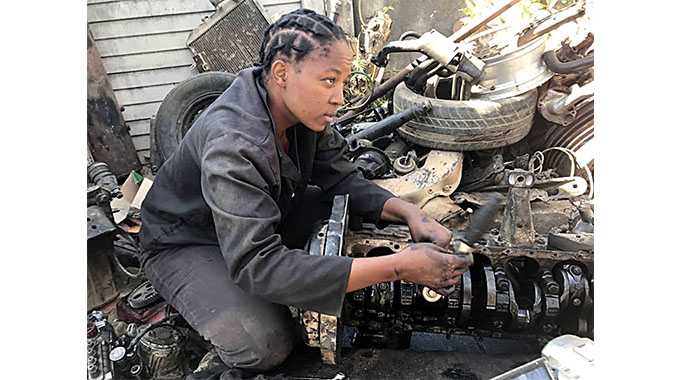
The Sunday News

Hazel Marimbiza, Sunday News Correspondent
Lady mechanic Memory Bere, fondly known as Memo Makanika has been fixing cars for seven years and is effectively challenging stereotypes that limit women to undertake certain kinds of jobs.
Bere was born in Chipinge and then moved to Chitungwiza where her father inspired her to quickly gain a fascination for cars and engines when she was still a child. In an interview with Sunday News, Bere narrated how she fell in love with fixing cars.
“My father inspired me to be a mechanic. I fell in love with cars when I was still young, around Grade Five. And growing up my father had a car which used to give him problems and most times we would take the car for repairs.

So I would go with my father to the mechanic. Every time when we saw the car being fixed we would closely watch and the next thing if the car developed the same problem we would fix it ourselves. In fact my dad would fix while I watched. My job was to give him the spanners. From there I was inspired to be a mechanic. When I told my father about my interests in becoming a mechanic he encouraged me. He told me that if I believe and have faith in myself I will succeed in the mechanics field,” she said.
While her father supported her wholeheartedly society had reservations. People did not like that she had chosen a field that was “unsuitable for girls” so she encountered a lot of challenges in her work.
“I have met challenges like sexual harassment, lack of support, lack of respect, and people doubting my knowledge just because I am a woman. Also the fact that there was no strong female mentor in my field was sometimes discouraging. Ever since I have ventured into mechanics I have never worked where there are female mechanics and I have never met women who are into mechanics,” she said.
Despite the challenges Bere had faith in herself.

“I believed I could dominate in this field as long as I work hard. There were men who used to discourage me but I never listened to them because my goal was to let the world know that there is a woman who can fix cars and that it’s not only men who can fix cars. So at the end those men who used to look down on me ended up encouraging me and giving me advice on how best I can do the job.
“The constraints, the obstacles, the challenges that could have driven me back, they became my opportunity. Now my job sustains me. I am able to buy food and help my family members. This gives me pressure to work harder but I am happy because the future looks bright,” she said.
Bere is not one to dream small. She wants to liberate, mentor and transform girls into role models and agents of change in communities across Zimbabwe, through sustained innovative approaches to skill impartation and a healthy mental guidance. She also wants to let women know that if she managed to excel in her trade then they can also excel.

“My dream is to have a workshop where I will be teaching women to fix cars. And also if I get money I will go to schools and encourage girls to take on trades which are dominated by men such as building, carpentry, and mechanics and plumbing because there is no job which is supposed to be categorised as being for men or women. I want to do this because on social media I keep on receiving messages from women who wanted to take jobs such as building but had to throw away their passion because society would say it’s not a woman’s job.”
Zimbabwe has always strived to achieve gender equality, but Sub-Saharan Africa is said to be one of the areas with the most women who are looked down upon when they take on male-dominated trades.
However, it is important to empower women to reach their full potential in whatever profession they desire because women play a critical role in sustainable development. Empowered women contribute to the health and productivity of whole families and communities and they improve prospects for the next generation.



